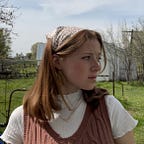Romanticizing life- the real way
“I saw
that my life
was a vast glowing empty page
and I could do anything
I wanted.”
— Jack Kerouac
So many times we are told to not romanticize life. Whether it’s because it “isn’t realistic,” or even because “some things are just bad and we must accept that.” The truth is, we should be romanticizing life, to its fullest extent.
Just because something is bad, horrible, or ugly, does mean that romanticizing it will take that away or conceal the truth. Sometimes this just means making it bearable. Life never goes the way we expect it to and that is just one of its beauties.
Romanticizing life is not convincing yourself that everything is wonderful, it’s simply finding beauty in all that isn’t.
Okay, now that I have covered some of the reasons why this whole romanticizing life thing may be worth checking out, I’ll explain what this completely entails.
I once read a post — written by the username “Polymekanos” — that described how you should live your life. A common mantra that is spoken throughout the world is to live your life as if it is your last. However, when we really think about it, why would we want to live our life like that? I suppose they mean to live life to the fullest but I don’t believe that we have to do that to truly be happy. We shouldn’t live life like it’s our last day but instead — live it as if it’s our first. Experience things like you’ve never experienced before because what is more wonderful than seeing a newborn’s first glance at life? They wrote,
“…because the secret to immortality is this: let yourself be reborn every day, every moment, even. For what can death be, then, but another beginning?”
When you feel overcome by things such as sadness, anger, betrayal, grief, or something that seems absolutely unlovable, it’s okay to realize that you don’t have to love it. It is okay to feel that way. When it all feels so unbearable, you find ways to bear it, and that is how you get through it.
One day, my friend texted our group chat that their family was in the process of transporting their white piano to their garage from their moving van when, in a panicked minute of extreme lifting, the piano slipped from their grasp and fell down a hill next to their driveway. While this was definitely a poor plan and execution on their part, they couldn’t help but laugh at the tragic ending of this piano’s life. A photo was then sent, and there it was: a beautiful, though slightly damaged, piano, lying perfectly at the bottom of a deep ravine. It’s important to note that they lived in thick trees and this piano had somehow managed to evade every single one on its journey down.
I remember us asking if it still worked and he said that a couple of keys did in fact play something to the resemblance of their notes. My friend was noticeably upset at the death of this instrument that he has been excited to play at his new house. But another friend seemed oblivious to this fact and sent one message, “It’s sort of beautiful, isn’t it?”
It reminded me of a book I read once called, “If he had been with me,” by Laura Nowlin. It reads,
“But you think we’re here for beautiful things, and you think sadness is beautiful?”
“It can be.”
And I couldn’t help but think how right that was. A broken piano, unplayable, lying at the bottom of a hill in the woods. The idea of the sunlight hitting it just right, or moss and vines slowly growing over it throughout the years. The prospect that something that once created such beautiful sounds will never speak again. And to take it a step further — it will one day become overgrown by the very thing that created it in the first place. That in the end, the original beauty — nature — will consume every secondary beauty we have made.
The friend who tragically lost the piano laughed, but the piano is still there to this day.
There is no specific way to romanticize your life.
If you search “ways to romanticize your life,” in your search bar, you’ll get lists of ways to slowly integrate this new lifestyle change into your daily routine. But honestly, that will just make it another burden in your life. Don’t create lists or bullets, just change your perspective. Get out of the thought process that when life goes wrong or not the way we want it to, we can still find beauty in the wrong.
As you have probably noticed, I’m a big literature person so I’m gonna end this on an excerpt from “The Secret History” by Donna Tartt.
“Death is the mother of beauty,” said Henry.
“And what is beauty?
“Terror”
“Well said,” said Julian. “Beauty is rarely soft or consolatory. Quite the contrary. Genuine beauty is always quite alarming.”
